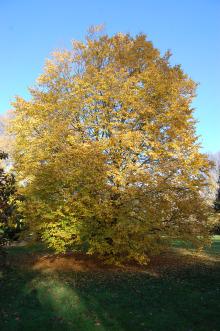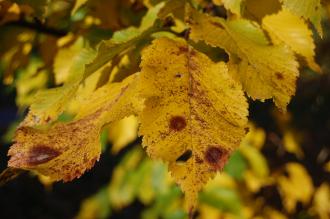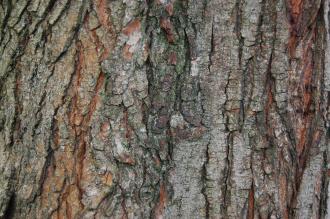
Ulmus ‘Dodoens’ (18/11/2012, Kew Gardens, London)
Position: Full sun to light shade
Flowering period: Spring
Soil: Moist, well drained
Eventual Height: 20m
Eventual Spread: 7m
Hardiness: 5a – 9a
Family: Ulmaceae
Ulmus ‘Dodoens’ is a fast growing decoduous tree with upright branches and a broad spherical crown. Its dark green leaves are ovate with serrate margins, up to 14cm long and 10cm broad. Its leaves turn yellow in autumn before they fall. Its sliver/ gray bark is fissured. Its yellow/ green flowers appear as dense bundles. Its brown fruit is a winged nutlet.
Ulmus ‘Dodoens’, commonly known as Dodoens Elm, is a hybrid of Ulmus glabra ‘ Exoniensis’ and Ulmus wallichiana and was created in Holland. Ulmus ‘Dodoens’ has a moderate resistance to Dutch Elm Disease.

Ulmus ‘Dodoens’ Autumn Leaf (18/11/2012, Kew Gardens, London)
The etymological root of the binomial name Ulmus is from the Latin name for the Elm tree. The cultivar name Dodoens is named after Rembert Dodoens (1517 – 1585), a Flemish physician and botanist.
The landscape architect may find Ulmus ‘Dodoens’ useful as a street tree due to its tolerance of urban conditions. It has fantastic autumn color. It is tolerant of maritime conditions.
Ecologically, Ulmus ‘Dodoens’ seeds are attractive to some birds.

Ulmus ‘Dodoens’ Bark (18/11/2012, Kew Gardens, London)
Ulmus ‘Dodoens’ prefers moist, fertile, well-drained soils. It tolerates most pH of soil, although it prefers chalky soils.
Ulmus ‘Dodoens’ requires little maintenance.

